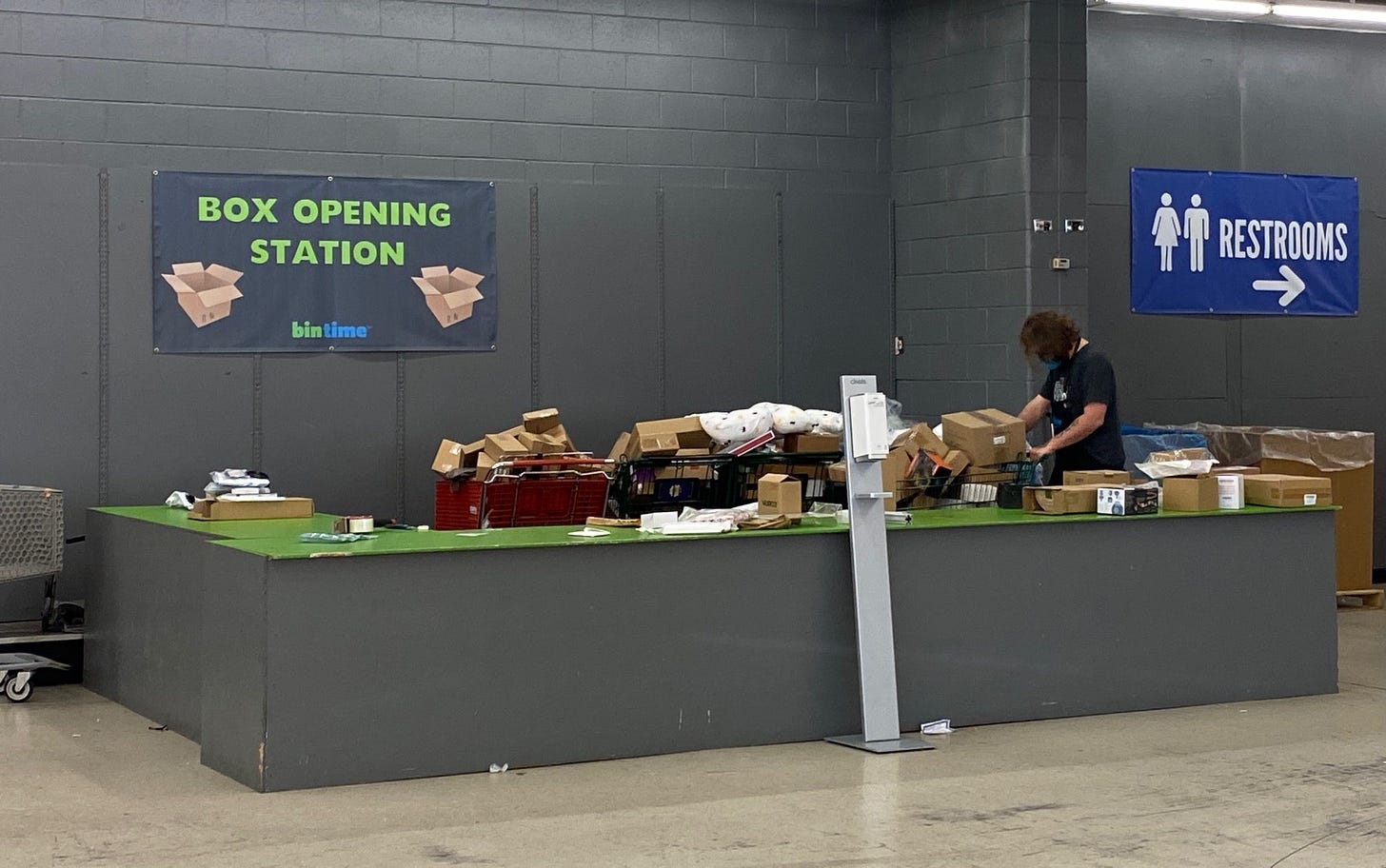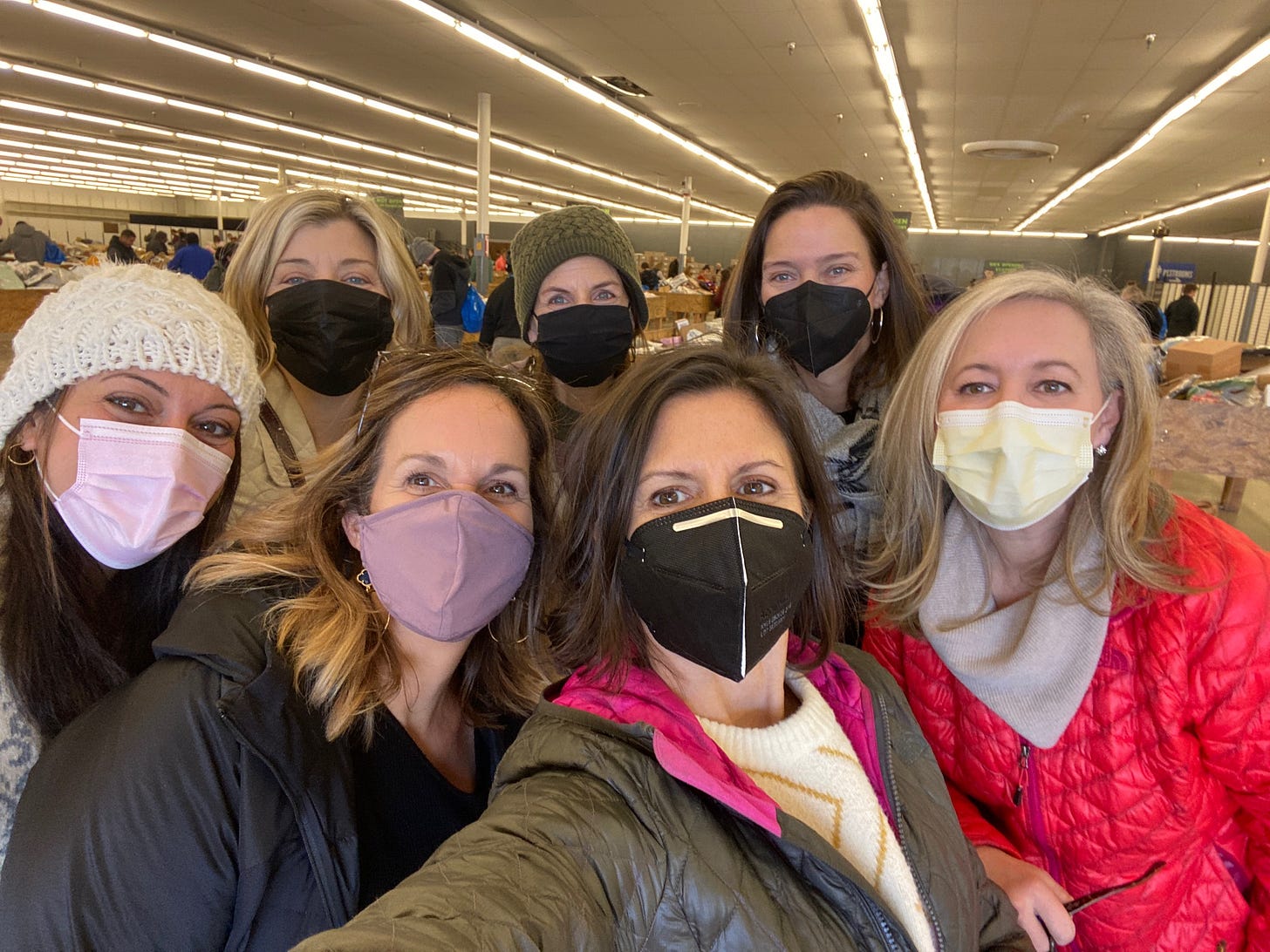Treasure hunting time in Amazon bins
Plus the news of the week: Mask mandate staying put — Remembering Cheslie Kryst — Redistricting maps struck down — Parking changes at the airport
Good morning! Today is Saturday, February 5, 2022. You’re reading The Charlotte Ledger’s Weekend Edition.
Need to subscribe — or upgrade your Ledger e-newsletter subscription? Details here.
Today’s Charlotte Ledger is sponsored by SPARK Publications. SPARK Publications publishes nonfiction books that help your business grow. Thinking about writing a book? “Ask Fabi” is a free virtual Q&A held on February 10, at 6:00 pm (EST). Register here!
Ever wonder what happens to the stuff that doesn’t get sold on Amazon? Roll up your sleeves at Bin Time near Greenville, S.C., and find out.
Does this image stress you out? Picking through giant tables of overstock goods isn’t for everyone, but plenty of people are regular visitors to Bin Time, an Amazon overstock outlet near Greenville, S.C.
by Cristina Bolling
I love a good bargain and I’m always curious about retail subcultures, so when I realized that an upcoming weekend trip to Greenville, S.C., would take me just a few miles away from an Amazon overstock warehouse, I put it on the calendar to hit on my drive home.
To my surprise, the six adventurous friends I was traveling with for a weekend away were also curious to see where unsold Amazon goods wind up. So on a Saturday morning in January, we headed to Bin Time, an overstock warehouse in a strip mall in Mauldin, S.C., to rifle through table after table filled with the most random potpourri of objects, all priced at $5.
Bin Time works like this: Every Saturday and Sunday, all items in the bins are priced at $5. On Mondays everything is $3, Tuesdays it’s all $2, and on Wednesdays prices drop to 50 cents an item. There is also a separate section of the store where higher-value items are priced as marked — you’ll find mainly clothes, shoes and appliances there. Retailers like Bin Time buy mass shipments of overstock items each week, so inventory is constantly changing.
I’ll speak for the group when I say it was a shopping trip unlike any of us had ever experienced. And after it was over, we had the most amazing show-and-tell session with our purchases over glasses of wine.
In case you one day find yourself near an overstock warehouse (there are others within a few hours drive of Charlotte) and you too are curious, here’s what you need to know. Judge for yourself if it’s for you:
Show up early to score the best stuff: Doors open at 10 a.m., but the serious shoppers get there at 8 a.m. so they can get first pick at the goods. The Bin Time website says you’re allowed to line up outside at 8 a.m., but the day we were there, shoppers we talked to said they had to wait in their cars until 9 a.m., when they were allowed to line up outside.
Experienced shoppers had stories of big finds like Yeti tumblers, Beats headphones and Roomba vacuum cleaners. (One woman excitedly told me about the time she found a $300 welding helmet in the bins.) Our group got there around 11 a.m., and it’s safe to say we didn’t see any high-value items like those.
Grab a bag: You can’t bring duffel bags, large purses or shopping carts inside. As you step through the door, you’re greeted by a giant bin filled with 19-gallon IKEA bags that you borrow to carry around your purchases. (When you check out at the registers, items are put in a clear trash bag for the ride home and you put the IKEA bag back in the bin where you found it.)
Then hit the bins. I’d say wooden troughs is the best description for the tables on which goods are piled with no rhyme or reason. Digging through the bins requires patience. Cell phone cases are the most ubiquitous items, but you’ll also see a lot of holiday décor (there seemed to be a lot of seasonal outdoor flags, and random strings of lights), housewares like wine glasses and tablecloths, and even some medications and beauty products.
Enjoy the community feeling. I’d wrongly expected that hunting for treasure would be a competitive sport, and that professional resellers might elbow out newbies like me. That was not the case. One woman handed me a box of wine glasses and said she’d bought the same ones the week before and really liked them. When my friend was searching for an Aztec clay face mask that a few of us had found in the bins, a stranger spotted one and walked it over to my friend.
Scan the bar codes on the mystery boxes. About 10 minutes into my Bin Time experience, I noticed shoppers around me using the Amazon app on their cell phones to scan bar codes on unmarked boxes that would reveal the boxes’ contents and allow them to see their price on Amazon. Aha! I turned into a bar-code-scanning addict, grabbing up boxes that only had bar codes on them to see what contents might be inside. One friend found an attractive $30 bamboo tray in an unmarked box. Nice!
How’s this for random? I used my Amazon app to scan the bar code on the small box in the left image, and what popped up was this “TO MY WIFE” music box (valued at $9.99, apparently). I left it behind for another Bin Time shopper to enjoy.
But no opening boxes! This is maybe the No. 1 rule at Bin Time, and it makes sense. To avoid box contents spilling all over the place, you’re not allowed to open any boxes as you shop. If you want to see what’s inside a box, you take it to the “Box Opening Station,” where a friendly worker opens it up, allows you to inspect it, and then seals it back up and either hands it back to you to buy, or stacks it next to him if you don’t want it.
The takeaway: I can’t say that anyone in our group of seven found any unbelievable deals. I may have purchased the highest-value item in the group — a sanitizing wand that (according to Amazon) retails for $80. It’s one of those items I wouldn’t have ever searched out and, frankly, will rarely use.
When we first arrived, we thought we’d struggle to find anything we wanted to purchase. But after about two hours, we all had IKEA bags loaded with 5 to 10 items.
Our purchases included: an ergonometric foot rest for under a work desk; a set of three decorative succulent plants in pots; clay face masks; a weather cover for an outdoor heater; a sushi-making kit; a set of four pop-it fidget toys; phone and earbud sanitizing boxes (those were $6, in the price-as-marked section), butt-lifting women’s leggings (bought for a laugh) and a box of 32 assorted snack-sized Frito-Lay chips (likely there because the expiration date was just a month away).
Would we have made the 2-hour-each-way trip to Mauldin just to go to Bin Time? Definitely not.
But we came away with some good laughs, our curiosity satisfied, and a few items to remind of us of our fun treasure-seeking adventure.
Cristina Bolling (front row, third from left) is managing editor of The Ledger: cristina@cltledger.com
Today’s supporting sponsors are Soni Brendle…
… and Whitehead Manor Conference Center, a peaceful, private, and stress-free space for your organization’s next off-site meeting or event. Conveniently located in South Charlotte, Whitehead Manor is locally owned and operated and provides modern meeting capabilities with attention to stellar service!
This week in Charlotte: Redistricting maps struck down; clear backpacks on the way to high schoolers; remembering Cheslie Kryst; big donations for library and Communities In Schools
On Saturdays, The Ledger sifts through the local news of the week and links to the top articles — even if they appeared somewhere else. We’ll help you get caught up. That’s what Saturdays are for.
Education
School safety: (WSOC, WBTV) Charlotte-Mecklenburg Schools officials say the clear backpacks they ordered for high schoolers to increase safety and curb gun violence are now in a district warehouse and will be distributed in the next few weeks. And the district is rolling out the Say Something Anonymous Reporting System to submit anonymous tips if they see things like bullying, harassment, weapons or threats.
Education donation: (Observer) Philanthropist MacKenzie Scott donated $5M to Communities In Schools of Charlotte-Mecklenburg — the largest gift in the local charity’s history. CIS-Charlotte works with 54 Charlotte-Mecklenburg schools and serves more than 4,000 students. Scott’s gift was part of a $133.5M donation she gave to the Communities In Schools Network and National Office.
Politics
Redistricting maps struck down: (WFAE) The North Carolina Supreme Court voted 4-3 to strike down the state's new maps for congressional and General Assembly seats Friday, saying state courts had authority to throw out lines drawn to secure a long-term Republican advantage in an otherwise closely divided state. The decision directed the GOP-controlled legislature to redraw the plans by Feb. 18 and provide an explanation of how they calculated the partisan fairness of the new boundaries.
City council developer dough: (Ledger 🔒) An analysis of campaign finance reports shows that people in Charlotte’s real estate industry were some of the biggest donors to City Council members in the last half of 2021. We have links to campaign finance reports filed with the N.C. Board of Elections.
Scarborough to take leave: (Joe Bruno on Twitter) County commissioner Ella Scarborough plans to take a medical leave of absence, her children told WSOC’s Joe Bruno on Thursday. Scarborough had not been seen or heard from in months and was still collecting pay as a commissioner. Her children said she will not be paid during her leave of absence and will not run for re-election.
Local news
Mask mandate to stick around: (Ledger 🔒) Mecklenburg County Health Director Raynard Washington told county commissioners Tuesday that he doesn’t support lifting the county’s mask mandate, although data shows Mecklenburg’s Covid rates during the Omicron outbreak weren’t lower than neighboring counties without mask mandates.
Background questioned: (WCNC) The woman announced this week to oversee Charlotte’s $250M Mayor’s Racial Equity Initiative was the subject of a requested criminal investigation linked to her former job as director of the Ohio Department of Job and Family Services. An Ohio state audit identified “lack of controls” within that agency resulting in $3.8B worth of unemployment fraud and overpayments during the pandemic.
No prescription for the pill: Starting this week, women in North Carolina are able to get birth control pills and patches without a doctor’s prescription. Pharmacists are now allowed to dispense the contraception. Reproductive rights advocates hailed the change in state law as a victory for easier access to healthcare.
Business
CPI Security lawsuit: (Ledger 🔒) A fight between Charlotte-based CPI Security and Utah-based Vivint Smart Home is headed to court following a string of court filings in which the companies have traded accusations of using unethical practices to gain an edge. The case started in September 2020, when CPI filed suit, accusing Vivint of using deceptive sales tactics, such as showing up at CPI customers’ houses and “posing as CPI employees or affiliates” to sell Vivint hardware and service. The dueling court filings give a rare glimpse into the rough-and-tumble and highly competitive world of home security sales
Buyer for Carowinds’ parent company? (CNBC) Carowinds parent Cedar Fair said it’s reviewing an unsolicited buyout offer from SeaWorld Entertainment that Bloomberg News said was valued at $3.4B. SeaWorld owns Busch Gardens. Officials in Sandusky, Ohio, where Cedar Fair is based, said over the summer that they feared the company was moving vital jobs to Charlotte.
Sports
Charlotte FC tickets: (Axios Charlotte) Charlotte FC, Charlotte’s new pro soccer team, has sold more than 20,000 season tickets, and it has sold more than 60,000 tickets for its first home game on March 5, the team’s president said.
‘The Dragon’ returns: (Observer) Pro wrestling Hall of Famer Ricky “The Dragon” Steamboat is scheduled to return to Charlotte this month as a “special matchmaker” in a wrestling event on Feb. 26. He’s 68 years old.
Good reads
I minted an NFT: (Ledger) We were perplexed about the much-talked-about world of NFTs, or nonfungible tokens, so we got help from local expert and Friend of the Ledger John Short, who walked us through minting our very own Ledger NFTs. (We’ll tell you Monday whether we made any money.)
Cheslie Kryst’s radiant life: (Ways of Life 🔒) Ledger managing editor Cristina Bolling shares her memories of writing about Cheslie Kryst, the former Charlotte attorney and Miss USA who died by suicide last Sunday. “For many of us, Cheslie changed how we viewed women in pageants. For her, swimsuit contests were demonstrations of physical power. Pageants, she said, gave her a chance to elevate causes important to her. They let her meet people and travel. And on the national stage, she showed the world that a woman could be powerful and smart and beautiful all at once.”
From the Ledger family of newsletters
Anger over apartments: (Friday 🔒) The tension between developers planning new houses and apartments for a growing city and neighbors who don’t want to deal with more traffic and loss of trees is playing out yet again, this time off Pineville-Matthews Road across from Providence High School. Residents there object to plans to replace 66 units from the Legacy Arboretum apartments with 300 new ones.
More anger over apartments: (Friday 🔒) A developer has already scaled back plans to put hundreds of apartments next to a future elementary school on Ardrey Kell Road, but city planners and the city councilman who represents that area say there are still too many units. They say that stretch of Ardery Kell Road is already too congested.
Airport parking: (Ledger 🔒) Charlotte’s airport has shortened the grace period for free parking in the hourly deck from 1 hour to 15 minutes — a change that makes it more expensive to escort an elderly passenger or a traveling-alone teen inside. Airport officials said the first-hour-free policy started during the construction of the curb-front roadway in front of the terminal and was extended due to Covid.
Rough January for restaurants: (Friday) Winter weather and Covid kept diners out of Charlotte restaurants in January. An analysis of OpenTable data showed that the 7-day average number of diners in Charlotte was down by more than 50% in the middle of the month, compared with the same dates in January 2019, before the pandemic. Since last spring, the numbers for Charlotte had been tracking pretty closely to 2019 levels, and maybe even a little better.
Transit Time: The Charlotte area has traditionally had regionally siloed transportation systems. So what would it take to build a regional system? This week’s Transit Time newsletter looks at how other cities approach funding and operational decisions for transit systems and explores what the future could hold for Charlotte.
County official buys liquor in S.C.: (Friday 🔒) Liquor shortages in Mecklenburg ABC stores have been an issue for months, and even Mecklenburg County’s top elected official turned to a popular South Carolina liquor retailer recently to buy booze for a campaign event.
Broadcasting school signs off (Wednesday 🔒): After 65 years in operation, the Carolina School of Broadcasting is ceasing operations.
Need to sign up for this e-newsletter? We offer a free version, as well as paid memberships for full access to all 3 of our local newsletters:
➡️ Learn more about The Charlotte Ledger
The Charlotte Ledger is a locally owned media company that delivers smart and essential news through e-newsletters and on a website. We strive for fairness and accuracy and will correct all known errors. The content reflects the independent editorial judgment of The Charlotte Ledger. Any advertising, paid marketing, or sponsored content will be clearly labeled.
Got a news tip? Think we missed something? Drop us a line at editor@cltledger.com and let us know.
Like what we are doing? Feel free to forward this along and to tell a friend.
Sponsorship information: email editor@cltledger.com.
Executive editor: Tony Mecia; Managing editor: Cristina Bolling; Contributing editor: Tim Whitmire, CXN Advisory; Contributing photographer/videographer: Kevin Young, The 5 and 2 Project










